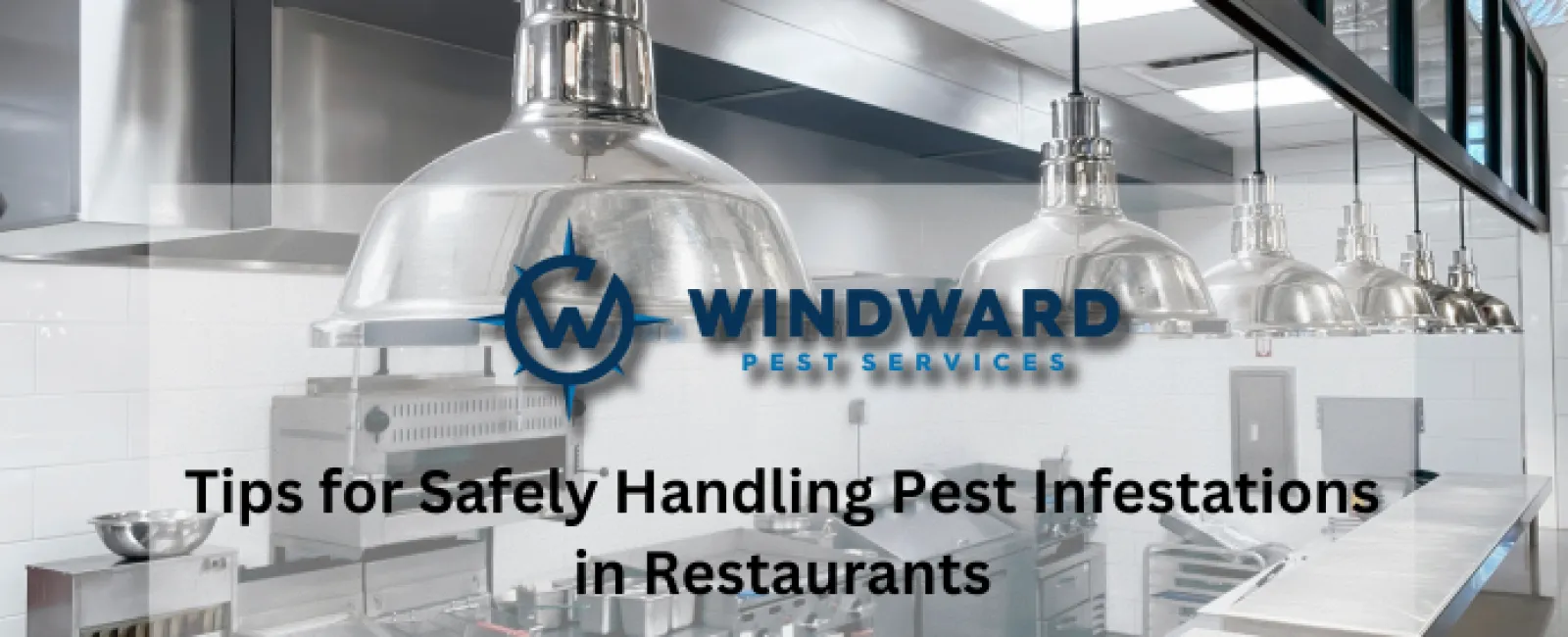Running a restaurant involves many responsibilities, from maintaining food quality to ensuring customer satisfaction. One of the most critical but often overlooked areas of restaurant management is pest control. For establishments in Atlanta and surrounding areas, Atlanta pest control measures are essential for maintaining a clean, pest-free environment. Pests in restaurants pose serious health risks, harm the restaurant's reputation, and can even result in costly fines or shutdowns due to health code violations. Given these stakes, understanding how to safely handle pest infestations is essential for every restaurant owner and manager.
When it comes to restaurant pest control, working with professionals like Windward Pest Services can make a significant difference. With a focus on Atlanta interior and exterior pest treatments, Windward Pest Services helps restaurants in the region implement effective strategies for preventing, identifying, and treating pest problems. This article will cover the key factors that make restaurants susceptible to pests, the types of pests commonly found in restaurant settings, and practical steps that management can take to handle infestations safely and effectively.
Why Are Restaurants Susceptible to Pest Infestations?
Restaurants are particularly vulnerable to pest infestations due to a combination of environmental and operational factors. Understanding these factors is the first step toward creating an effective pest control strategy.
- Constant Availability of Food and Water: The most obvious reason pests are drawn to restaurants is the constant availability of food and water. Food preparation areas, trash bins, and even spills on floors attract a variety of pests, including rodents and cockroaches.
- High Foot Traffic: With multiple people entering and exiting daily, doors are frequently left open, allowing pests easy access. The flow of deliveries also increases the likelihood of pests entering unnoticed.
- Humidity and Moisture: Kitchens are typically high-humidity environments due to the use of water and cooking equipment. Moisture attracts pests like cockroaches and ants, making areas near sinks, dishwashers, and drains hotspots for infestations.
- Storage Areas and Packaging: Restaurants receive goods in cardboard boxes and packaging materials that can harbor pests like cockroaches. Additionally, storage areas that are not regularly inspected provide hiding spots for pests.
Because of these factors, restaurants must be vigilant in monitoring for pests, and they should prioritize regular restaurant pest inspections to catch and address issues early.
Common Pests in Georgia Restaurants
The types of pests that typically infest restaurants can vary depending on the region, but in Georgia, several pests are particularly common due to the warm climate. Being familiar with these pests and knowing how they behave can aid in early detection and treatment.
1. Cockroaches: Cockroaches are one of the most common pests in restaurants. They are drawn to warmth, moisture, and food, making kitchen areas especially vulnerable. Cockroaches can carry bacteria and contaminate food, which poses health risks to customers and employees.
2. Rodents (Mice and Rats): Rodents are a major concern for restaurants as they are notorious for gnawing on food packaging, contaminating surfaces, and spreading diseases. Rodents can enter through even the smallest openings, so consistent inspections and sealing entry points are essential.
3. Flies (House Flies, Fruit Flies): Flies are a nuisance, and they also carry pathogens that can lead to food contamination. House flies are attracted to food residues, while fruit flies thrive near trash cans and drains where moisture is present.
4. Ants: Ants are commonly found in restaurant settings, especially near food storage areas, dishwashing stations, and food preparation counters. Ants are quick to swarm, making it difficult to contain an infestation once it begins.
5. Stored Product Pests: Stored product pests, such as flour beetles, weevils, and pantry moths, can be found in dry goods like flour, sugar, and grains. These pests contaminate food supplies and can lead to significant financial losses.
Understanding the types of pests common in Georgia restaurants enables owners to implement targeted Atlanta pest control solutions for prevention and treatment.
Key Steps for Safe Pest Control in Restaurants
Effectively managing pests in a restaurant setting requires an approach that combines prevention, monitoring, and safe treatment methods. Here are the best practices for maintaining a pest-free environment:
1. Regular Inspections
Scheduling regular restaurant pest inspections is the foundation of any successful pest control strategy. Professional inspections from companies like Windward Pest Services can identify potential problem areas, assess vulnerabilities, and offer recommendations for treatment if necessary. Inspections should cover all areas, including the kitchen, dining areas, storage rooms, bathrooms, and exterior spaces.
2. Implementing a Cleanliness Routine
Maintaining a high standard of cleanliness is essential for preventing pest infestations. Key elements of an effective cleanliness routine include:
- Daily Cleaning of Food Prep Areas: Ensure that all food preparation areas are cleaned daily, removing any food particles, grease, and spills that could attract pests.
- Emptying Trash Bins Frequently: Trash bins should be emptied frequently and cleaned regularly to prevent odors and residue buildup.
- Proper Storage of Ingredients: All ingredients should be stored in sealed containers to prevent pests from accessing them. Storage areas should be checked weekly for any signs of pest activity.
3. Using Safe Pest Control Products
Since restaurants handle food, it's crucial to use pest control products that are safe for foodservice environments. Atlanta interior and exterior pest treatments can include the use of food-safe products that control pests without risking contamination. Pest control professionals can recommend safe treatments such as insect baits and gels designed specifically for restaurant settings.
4. Sealing Entry Points
Pests often enter restaurants through cracks, gaps, and open doors. Sealing entry points, especially around windows, doors, vents, and utility openings, can significantly reduce the likelihood of pests entering. Applying weather stripping to doors, repairing window screens, and sealing cracks in walls are effective ways to prevent pest entry.
5. Monitoring Moisture Levels
Maintaining a dry environment in the kitchen and storage areas is critical for keeping pests like cockroaches, ants, and flies at bay. Fixing leaks promptly, using dehumidifiers, and regularly cleaning drains are effective ways to control moisture levels. Monitoring moisture helps keep pest-prone areas dry, minimizing the risk of infestation.
6. Trash Management
Proper trash management is essential for preventing pest problems. Make sure trash cans have tight-fitting lids, and keep them a distance away from building entrances. Clean the area around dumpsters regularly to avoid attracting pests to restaurant exteriors. Trash management should be part of routine Atlanta residential and commercial pest services for restaurant settings.
The Role of Professional Pest Control in Restaurants
While restaurant staff can manage certain preventive measures, partnering with a professional pest control service is essential for comprehensive pest management. Windward Pest Services provides customized Atlanta pest control solutions for restaurants, addressing unique challenges and ensuring compliance with health codes. Here's how professional services can benefit restaurants:
- Specialized Knowledge of Restaurant Pests. Pest control professionals are trained to identify signs of infestation early and can recommend treatments specific to restaurant settings. Windward Pest Services understands Georgia pests and tailors treatment plans based on the needs of each restaurant, taking into account the size, layout, and specific vulnerabilities of the property.
- Safe, Effective Treatments. When it comes to restaurants, safety is paramount. Windward Pest Services offers Atlanta interior and exterior pest treatments that are safe for food service environments. Professionals use approved products and methods that minimize risk to employees, customers, and food supplies.
- Ongoing Monitoring and Prevention. An effective pest control strategy includes continuous monitoring. Scheduling regular pest inspections as part of a restaurant pest inspection plan allows for early detection and prevention of pest issues. Quarterly or monthly inspections can help ensure that the restaurant remains pest-free, which is particularly important for passing health inspections.
- Health Code Compliance. Maintaining compliance with health codes is crucial for restaurants. Working with a professional pest control provider ensures that pest management practices adhere to local regulations. Services from companies like Windward Pest Services can prevent potential penalties or closures that could arise from pest-related code violations.
The Value of Proactive Pest Control in Restaurants
For restaurant owners, managing pests isn't just about cleanliness—it's about ensuring a safe environment for customers and staff, protecting the restaurant's reputation, and maintaining compliance with health codes. By understanding why pests are drawn to restaurant environments and implementing proactive measures, restaurant managers can significantly reduce the risk of infestations. Regular restaurant pest inspections and a comprehensive pest management plan are essential to avoid the costly consequences of unchecked pest activity.
Partnering with professionals like Windward Pest Services can make pest management more manageable and effective. With a deep understanding of Atlanta pest control and years of experience handling Atlanta residential and commercial pest services, Windward offers services tailored to meet the needs of Georgia restaurants. These services range from Atlanta interior and exterior pest treatments to ongoing inspections and monitoring that keep pest issues in check.
In the end, proactive pest control is an investment in the restaurant's long-term success. From sealing entry points and monitoring moisture levels to implementing a daily cleaning routine and scheduling professional inspections, these practices create a robust defense against pests. Protecting the restaurant environment from common Georgia pests not only enhances food safety but also builds customer trust and loyalty, ensuring the continued success of the establishment. With these practices in place, restaurant owners can focus on what truly matters—providing an exceptional dining experience free from the disruption of pest problems.

